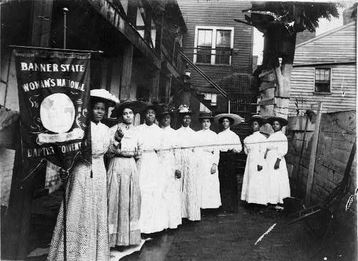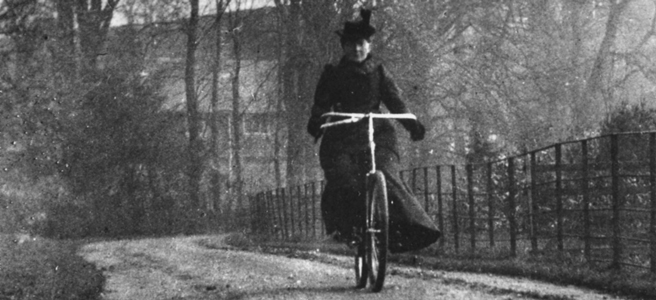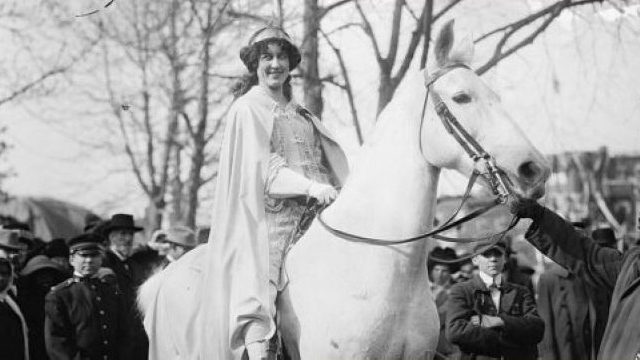Grace Goszkowicz, a student in Dr. Salah’s Cultural Heritage course “Marriage in the Modern Age,” shares her reflections below on a recent WGS & History event commemorating 100 years of women’s suffrage.
This past Tuesday, I had the privilege of attending the talk given by guest speaker Dr. Kristin Kobes Du Mez, an established historian and professor at Calvin University. Du Mez’s enthusiasm was clear as she eloquently engaged listeners with a historical account of the evolution of the struggle for women’s rights in America. As her announced research interests suggest, much of Du Mez’s work focuses on the intersection of gender, politics, and religion in American history.

In her talk, Du Mez persuasively addressed the subject of “Purity and Patriarchy: Christianity and the Struggle for Women’s Rights in America.” Du Mez prefaced her talk with a description of her sheltered, small-town upbringing, pointing out the perceived discrepancy between Christian teachings and feminist progress. Such tension, she said, was exemplified by prohibition of female leadership within the churches that she encountered growing up. For her, and many unfortunately, the edict was black and white: powerful, individualistic women did not conform to the feminine, chaste depiction of women in the Bible. With this train of thought then, the feminist movement that swept through the country following the Seneca Falls convention of 1848 must have lacked any sort of Christian support, right?
Wrong. Du Mez addressed this surprising realization, focusing on the Christian leadership of the first American women’s rights movement. Many Christian women took a stand on the issue, she explained, listing Sarah and Angelina Grimké, Mariah Stewart, Jarena Lee, and Sojourner Truth as critical trailblazers of the beliefs that later grew into the feminist movement.
Frances Willard, too, as Du Mez recounted, was a Christian woman and vital leader of the movement in the late 19th century until her death. A faithful member of the newly respectable Methodist church (which has allowed female ministers since the 1800s), Willard rejected the “cult of true womanhood” that was commonly accepted at the time, and, under her presidency of the Women’s Christian Temperance Union, transformed the women’s rights movement from a discreditable one to one of religious necessity. As a home-grown Methodist girl myself, I felt pride well up within my girl-power heart for the work of this kindred Methodist reformer. When I think back, I can remember my Methodist mother expressing her distaste for the Catholic church’s ban of female leadership—just a personal connection I made when Du Mez highlighted Willard’s views.

One of Willard’s suffragette contemporaries, Kate Bushnell, was a great focus of Du Mez’s presentation (and her previous book). Bushnell’s principal contribution to the women’s rights movement was calling attention to incorrect Biblical interpretation and translation. She advocated for and worked herself to accomplish a more accurate translation of the Bible, calling out all previous English translations in their doubly defined adjectives that, when concerning women, connote chastity, purity, and submission. This sparked my interest immediately—how was an original Hebrew word translated as strong when in reference to man but pure when describing a woman? Does that mean the Bible I read and hear read aloud (and hold as God’s truth!) more than a dozen times a week is incorrectly worded? In this way, Du Mez painted Bushnell as a pioneer of the reexamination of Biblical translation with respect to the portrayal of women—a Christian woman who worked to amend beliefs that deprecated females, previously seen as supported by religion. How fascinating!
The conclusion of Du Mez’s talk emphasized the effects of societal upheavals like World War I, the sexual revolution, and the bread-winner/homemaker era on the gender role and expectations of women. Long after the ratification of the amendment that constitutionally granted white women the right to vote, double standards were unfairly placed upon women: single or married, working or not. We have come a long way, Du Mez noted, but many tensions remain, and being a Christian and a feminist can still prove to be a complex double-label.
Throughout her impactful talk, Du Mez paid tribute to the powerful, Christian women who exercised their independence in order to fight for the rights of women. What a fantastic way to commemorate the 100th anniversary of the ratification of the 19th amendment! In closing, Du Mez reminded us that suffrage should not be taken for granted, but rather be continually sought after, fought for, and appreciated—ultimately striving for deserved dignity and rights for all. And to that, I say, amen!


